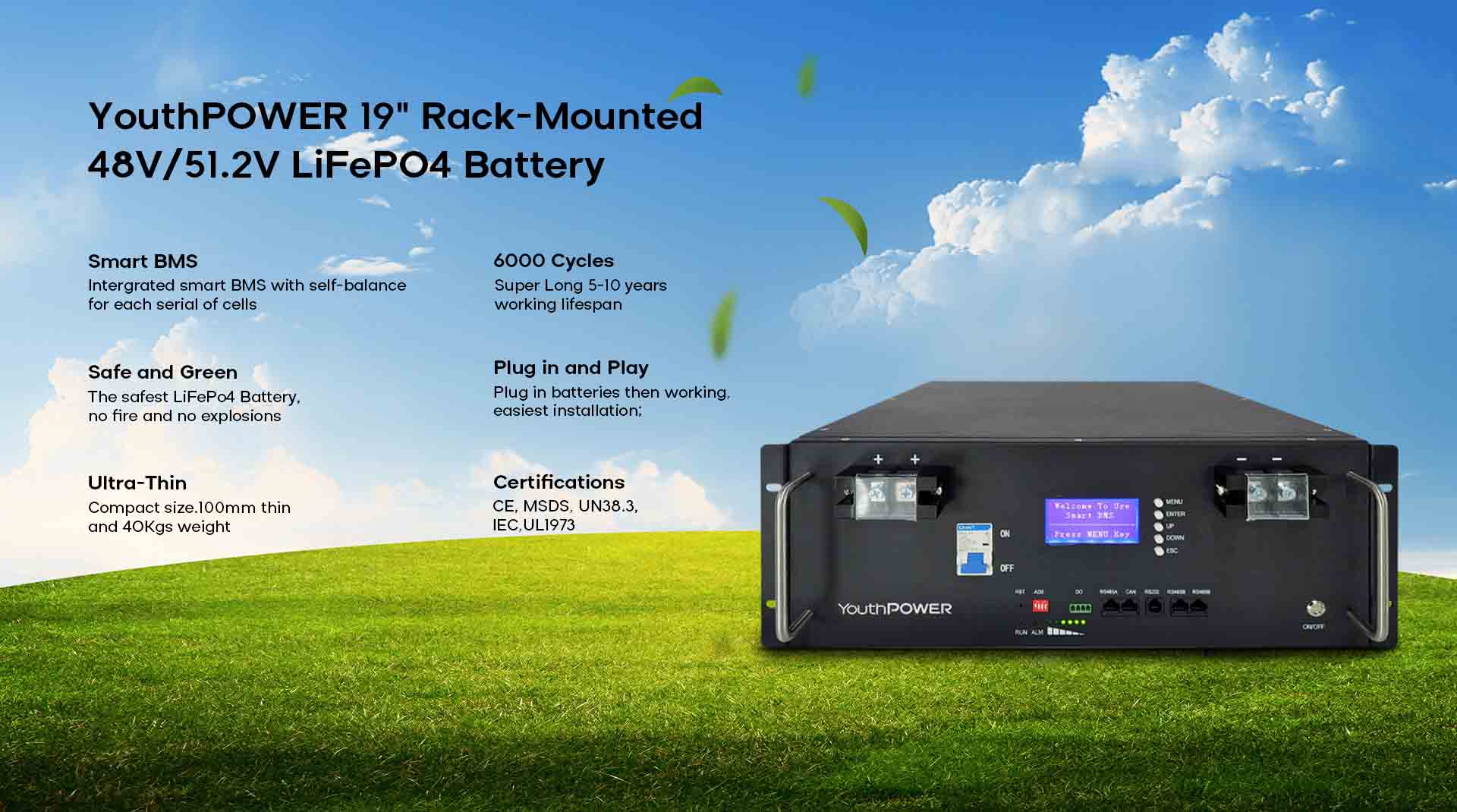Introduction
The growing demand for reliable power for homes and businesses has fueled significant interest in server rack batteries. As a leading choice for modern battery energy storage solutions, numerous lithium storage battery manufacturer companies are launching various models. But with so many options, how do you differentiate? This comprehensive guide will explore everything you need to know about LiFePO4 server rack battery systems, providing essential insights for lithium battery distributors and end-users alike.
What is a Server Rack Battery?
A server rack battery is an energy storage solution specifically designed to fit standard server racks, providing backup power for critical servers and network equipment within the rack. Also known as a rack battery or battery rack system, its form factor matches standard server chassis, allowing direct installation into common 19-inch server rack enclosures, hence the name 19″ Rack Mount lithium Battery.
These units are compact, typically ranging from 1U to 5U in height, with 3U and 4U being the most common. Within this space-efficient design—like a 1U to 5U footprint—you can find a complete 48V 100Ah server rack battery or 48V 200Ah server rack battery module.
These modules integrate a built-in Battery Management System (BMS), circuit breakers, and other functional components, offering a well-structured and easy-to-install ESS battery module.
Most modern systems use safe, long-lasting Lithium Iron Phosphate (LFP battery pack) technology. They often come with communication interfaces like CAN, RS485, and Bluetooth for remote control and real-time monitoring.

These server rack battery backup systems are widely used in data centers, home energy storage system setups, and telecommunications sites. Their stackable energy storage system design allows for easy capacity expansion through parallel connections, offering great scalability.
Models like the 51.2V 100Ah server rack battery and 51.2V 200Ah server rack battery are market leaders, storing approximately 5kWh and 10kWh of energy,
respectively. When connected to the grid, they act as an uninterruptible power supply (UPS) or UPS battery backup, ensuring continuous power during outages.
Pros and Cons of Server Rack Batteries

Advantages of Server Rack Batteries
- ⭐ Space-Efficient Design: Their standardized form factor maximizes space utilization in a 19-inch server rack, making them ideal for both dense data centers and compact home energy storage setups.
- ⭐ Scalability: The stackable energy storage system architecture allows you to start small and expand your capacity by adding more units, supporting both small and large-scale energy storage needs.
- ⭐ High Performance & Safety: LiFePO4 server rack battery chemistry offers excellent thermal stability, a long cycle life, and high efficiency, making it a safe and reliable UPS power supply and battery energy storage solution.
- ⭐ Easy Management: Integrated BMS and communication capabilities simplify monitoring and maintenance of the entire battery rack system.

Disadvantages of Server Rack Batteries
- ⭐ Higher Initial Cost: Compared to traditional lead-acid batteries, the upfront cost of a LiFePO4 rack mount system is typically higher, though the total cost of ownership is often lower.
- ⭐ Weight: A fully loaded server rack battery 48v can be very heavy, requiring a sturdy battery storage rack and proper structural support.
- ⭐ Complexity: Designing and installing a large commercial energy storage system requires professional expertise to ensure safety and optimal performance.
Server Rack Battery Price
The price of a server rack battery varies significantly based on capacity (Ah), brand, and features. Generally, a 48v server rack battery like a 48V 100Ah server rack battery will cost less than a higher-capacity 48V 200Ah server rack battery. Prices are also influenced by the lithium storage battery manufacturer.

While market prices fluctuate, partnering with a reputable manufacturer like YouthPOWER LiFePO4 Solar Battery Factory can offer excellent value. As a direct factory, YouthPOWER provides high-quality and cost-effective UL1973, CE & IEC certified LiFePO4 server rack battery units, such as their 51.2V 100Ah server rack battery and 51.2V 200Ah server rack battery models, at competitive prices without compromising on safety or performance. It's always best to request a detailed quote based on your specific project needs.
How to Choose the Server Rack Battery You Need
- >> Determine Your Voltage: Most systems operate on 48V, making a server rack battery 48v the standard choice. Confirm your inverter's or system's voltage requirements.
- >> Calculate Capacity (Ah): Assess your power needs (load) and desired backup time. Options like 48V 100Ah or 51.2V 200Ah provide different levels of energy storage.
- >> Verify Compatibility: Ensure the rack mount lithium battery is compatible with your inverter, charge controller, and existing battery rack.
- >> Check Communications: For a seamless UPS battery integration and monitoring, verify communication protocol compatibility (e.g., RS485, CAN).
- >> Evaluate Useful Life and Warranty: The longevity of a server rack battery LiFePO4 is measured in cycle life (typically 3,000 to 6,000 cycles to 80% capacity). Crucially, review the warranty provided by the lithium storage battery manufacturer, as it reflects their confidence in the product. A longer and more comprehensive warranty period is a strong indicator of reliability and a better long-term investment.
- >> Prioritize Safety Certifications: Never compromise on safety. Ensure the rack mount lithium battery has passed rigorous international standards and holds relevant certifications. Look for marks like UL, IEC, UN38.3, and CE. These certifications guarantee that the battery rack system has been designed and tested to meet high safety benchmarks, reducing risks of fire or failure. For example, manufacturers like YouthPOWER design their LiFePO4 Server Rack Battery products to meet these global standards, providing peace of mind for both residential and commercial installations.
- >> Consider the Manufacturer: Choose a reputable lithium storage battery manufacturer with a proven track record for quality and safety for your rack mount battery backup. For instance, YouthPOWER has established itself as a reliable 48v rack type battery company, specializing in robust server rack LiFePO4 solutions. Their products are designed with universal communication protocols and a modular, stackable design, ensuring compatibility and easy expansion for both home energy storage system and commercial energy storage applications.

Server Rack Battery Maintenance and Safety Best Practices
Installation
- ▲ Professional Installation is Key: Always have your server rack battery backup system installed by a qualified technician.
- ▲ Proper Rack and Space: Use a robust battery storage rack designed for the weight. Ensure adequate ventilation and space around the battery rack to prevent overheating.
- ▲ Correct Wiring: Use appropriately sized cables and tight connections to prevent voltage drop and overheating. Follow all local electrical codes.
Maintenance
- • Regular Inspections: Visually check for any signs of damage, corrosion, or loose connections.
- • Monitoring: Use the built-in BMS and remote monitoring tools to track state of charge, voltage, and temperature.
- • Environment: Keep the server rack LiFePO4 system in a clean, dry, and temperature-controlled environment as per the manufacturer's specifications.
- • Firmware Updates: Apply updates from the manufacturer to ensure optimal performance and safety.
Conclusion
The LiFePO4 server rack battery represents a versatile, scalable, and high-performance battery energy storage solution. Whether for a critical data center uninterruptible power supply (UPS), a commercial energy storage application, or a modern home energy storage system, its standardized design and advanced technology offer significant value. By understanding its features, advantages, and proper safety practices, you can make an informed decision and leverage this technology for reliable and efficient power backup.
Frequently Asked Questions (FAQs)
A1. What is the difference between a UPS and a server rack battery?
Q1: A traditional UPS battery is often an all-in-one unit. A server rack battery is a modular component of a larger stackable energy storage system, offering greater scalability and flexibility, often functioning as the core of a modern UPS power supply system.
A2. How long does a Server Rack Battery LiFePO4 last?
Q2: A well-maintained LiFePO4 server rack battery can last between 3,000 to 6,000 cycles, often translating to 10+ years of service, depending on usage depth and environmental conditions.
A3. Can I use a server rack battery for my solar system?
Q3: Absolutely. A 48v server rack battery is an excellent choice for a solar battery rack setup, storing excess solar energy for use at night or during power outages.
A4. Are server rack batteries safe?
Q4: Yes. LiFePO4 chemistry is inherently safer than other lithium-ion types. When installed correctly in a proper battery rack and with a functioning BMS, they are a very safe battery energy storage solution.
A5. Can you add more batteries to the system later?
Q5: Yes, many batteries today, like LiFePO4, are modular. You can add units without stopping operations. Check if the battery allows parallel connections for easy expansion.
Post time: Oct-28-2025

